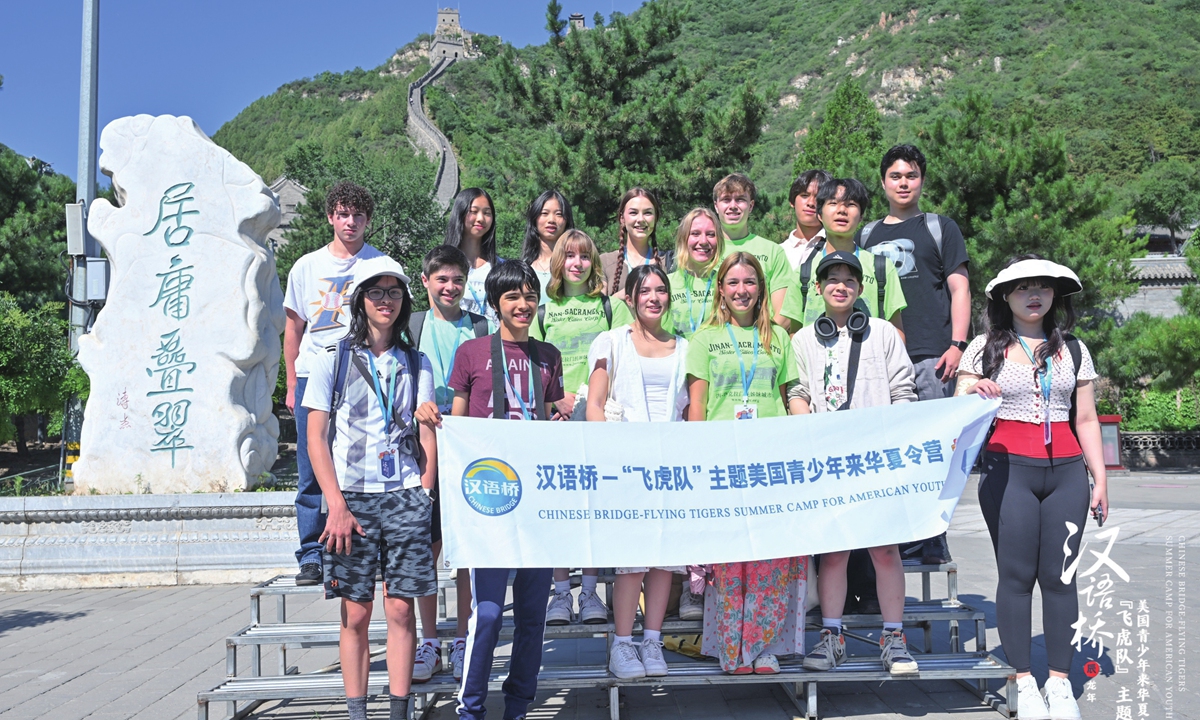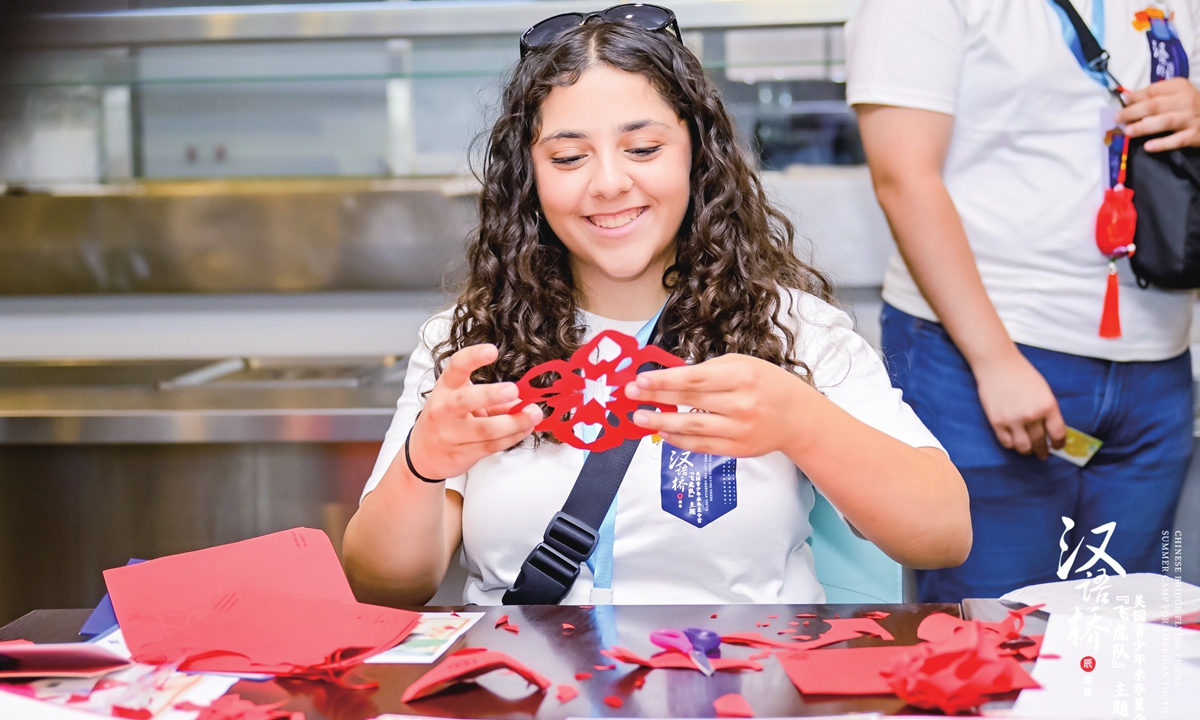
American students of the camp visit the Juyongguan section of the Great Wall in Beijing on June 25.Photos: Courtesy of Center for Language Education and Cooperation
Chinese calligraphy,
mk paper cutting, chess, pitch-pot, hanfu costume… When a group of American students were joyfully immersed in various forms of traditional Chinese culture under the guidance of their Chinese peers in Beijing on Wednesday, the melody of Ode to Joy suddenly sounded from the cultural experience hall of China's Center for Language Education and Cooperation (CLEC).
While an American student was singing, a Chinese student accompanied her with his Chinese transverse flute, attracting a lot of onlookers.
"That was amazing, and I believe this camp would be a precious lifelong experience for me," Cynthia, a student from the International Leadership of Texas, Garland High School, told the Global Times on Wednesday.
The cohort of American youths are from the Chinese Bridge Flying Tigers Summer Camp for American Youth who came to China to explore Chinese culture and learn more about the history of the volunteer US pilots, later known as the Flying Tigers during World War II.
"I have great expectations…" Jeffrey Greene, Chairman of the Sino-American Aviation Heritage Foundation, which helps raise funds to support the camp in the US, told the Global Times on Wednesday, adding that it is a remarkable opportunity for the students from both countries to learn from each other, and to carry on the spirit of Flying Tigers among the young generation.
Better shown than toldFor many of the US students, this is their first visit to China. Marco Javier Yerena explained his nervousness before the trip, saying he wasn't sure what to expect in terms of the people, food, and culture. But this feeling soon disappeared after arrival.
"After I stepped off the plane and got to roam around a bit, I was amazed, like, it was breathtaking, seeing how everything is so organized. Everything really relates back to the culture and it's just amazing," Marco told the Global Times.
As summer camps always act as a must-do list in US students' lives, few US students are likely to choose to come to China, especially amid current tensions.
Lucy from California found this opportunity rather precious. "It's for the curiosity. I've never been to China before and honestly, I don't think I would have come if I hadn't had this opportunity," Lucy told the Global Times, adding that after she came, she found it is a pretty refreshing experience, enjoying a trip to the Forbidden City and experiencing the friendliness of the people. "The teacher [tour guide] is amazing. She is like a library," Lucy added.
Amelia, also from California, referred to her special personal background with Chinese heritage in this particular historical period.
"If you like to detach yourself from what governments and Western media depict and you actually interact with the people, you realize that we're basically the same and everyone's just really friendly, and everyone just wants to get to know more people [and] more cultures," Amelia told the Global Times, emphasizing the importance of the actual visit and the interaction between both countries.
The students have visited scenic attractions like the Great Wall and the Forbidden City, while also experiencing traditional Chinese cultural activities, including learning how to play hulusi, a free reed wind instrument from China, and Chinese painting.
As the students' teacher, Hratch Arezouyan told the Global Times, this journey is still beneficial for students without certain backgrounds who have a good understanding of the culture. "You go to France, it's very different, and you come to China, it's also very different, like the building designs. Even if you're doing something in engineering, it's interesting because you get to see how people think about what is good," he said.

An American student experiences paper cutting at the camp opening ceremony in Beijing on June 26.
'Ambassadors of the US' According to the CLEC, the current Chinese Bridge Flying Tigers Summer Camp for American Youth is set to last for 16 days, ending on July 8. A total of 85 US students and campers from California, Washington DC, New York City, and among other places will come to Beijing and Southwest China's Yunnan Province, which is deeply connected to the Flying Tigers.
In 1941, during World War II, a team of American volunteer pilots, later known as the Flying Tigers, joined forces with China, supporting China to fight invading Japanese troops in Yunnan Province. They flew missions over the Himalayas, delivering crucial supplies and executing impressive feats.
In China, the story of the Flying Tigers is widely known and has become a fundamental part of many Chinese people's understanding of the US. This history provides valuable insights into the lasting impact of this era on contemporary China-US relations.
Greene told the Global Times that the camp carries forward the legacy of the Flying Tigers, a group that has been a symbol of China-US friendship for decades. The Sino-American Aviation Heritage Foundation, which organizes the camp, has been instrumental in bringing veterans to China for over 20 years. Although many of the World War II veterans have since passed away, their spirit lives on through the camp, ensuring that the next generation continues to build upon the foundation of friendship.
Greene gave a speech at the summer camp's opening ceremony, emphasizing boosting mutual communication between China and the US.
He said at the opening ceremony that all US students in the camp are "ambassadors of the US" and their interactions with the Chinese people will define relations between the two countries for a long time to come.
"It's not just about academic knowledge; it's about understanding the culture, history, and the spirit of a nation. The American participants will gain insights into China that cannot be purchased or replicated elsewhere. This exchange is a testament to the power of firsthand experience in shaping perspectives and fostering mutual respect," he told the Global Times.


